#@microcosme11
Explore tagged Tumblr posts
Note
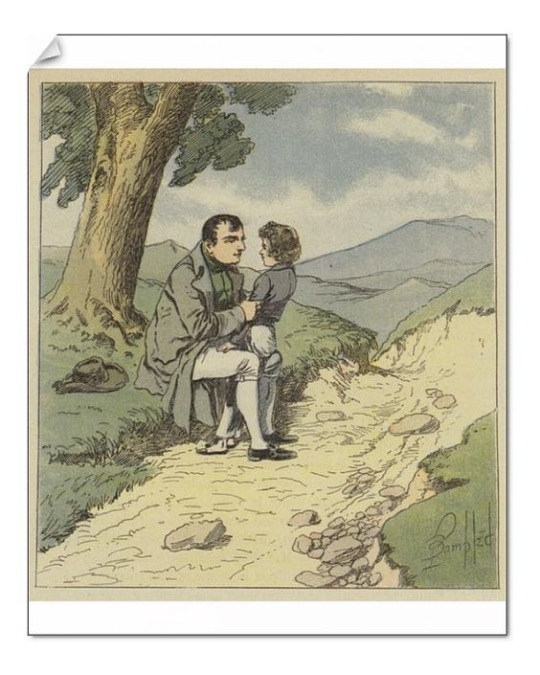
Rating: Cute!
Napoleons make great companions for children. Sure, it looks like the Napoleon is considering whether this boy is edible, and whether or not he should unhinge his jaw like a snake and swallow him whole as a yummy snack, but!
1.) napoleons hardly ever do that
2.) when they do, it’s usually against naughty British children who ate dessert before dinner or didn’t do well on their lessons or disappointed their parents
3.) this napoleon looks so content! And napoleons are bad liars and quick workers. If he wanted to eat the boy, he’d already be eaten
69 notes
·
View notes
Text
Review of Napoleon (2023)
So I saw Napoleon (2023).
eyes glaze over
collapses and melts into a puddle
This is possibly the most soporifically boring, relentlessly mediocre so-called "epic" I have had the misfortune to see.
Plotless, pointless, and devoid of anything approaching characterization, the movie can be best described as reenacted scenes from a wikipedia article about Napoleon as written by the Anti-Jacobin.
The whole thing is suffused with British reactionary propaganda circa 1815. The characterizations are all courtesy of the Anti-Jacobin and Rowlandson’s cartoons. Robespierre is a tyrant, Napoleon is a buffoonish loutish thug, and Josephine is a slut. There’s nothing there. There’s no character arcs, no development. Sure, it’s pretty enough, but it's boring. So, so, so boring.
While watching it, I was frequently in a fugue state, floating over my body, wondering, "what is a movie? is this what they're like now? with no drama, no characters, no arcs, no interest?"
In fact, I didn't watch it: I endured it.
Joaquin Phoenix is awful. He is completely miscast on every conceivable level. Mumbling, monotone, and charmless-- I never for one moment thought I was watching Napoleon-- it only felt like Phoenix's cosplay. He and Vanessa Kirby have so little chemistry they might as well be appearing in different movies. They supposedly have this grand obsession/love story, but this amounts to sitting in the same room staring off in boredom. There's the occasional ridiculous sex scene which is always doggie style with clothes on. But for the most part, Josephine just stands in the rain or stares off into the mist.
Oh yeah there's the occasional battle. Eh…
Napoleon’s life was filled with colorful characters like the foppish, extravagant and brave Murat, the bold and foul-mouthed Lannes, the scheming, irrepressible Fouche, and the bubbly nymphomaniac Pauline, none of whom are here, and you have a bunch of interchangeable extras standing around rooms or battlefields. The only character who makes any impression whatsoever is Edouard Philipponnat as Czar Alexander, and I would have rather had a movie starring this actor. Alas, that's not what we got.
A lot of money was spent on this movie. A lot of choices were made. The result was a bland, forgettable dud that immediately fell into a memory hole as soon I departed the theatre.
As Napoleon himself would say, BAH!
PS. @microcosme11 and I didn't watch the entire thing, because it is 2 hours and 40 minutes long. As all the restaurants in the neighborhood were closing at 10, we left half an hour early, right before Waterloo and after Josephine died of pneumonia, so we could have burgers and a richly deserved beer.
PPS. Feel free to ask me for specifics!
@thiswaycomessomethingwicked @lordansketil @joachimnapoleon @usergreenpixel @twice-told-tales @josefavomjaaga @bunniesandbeheadings @jefflion
#napoleon movie#ridley scott's napoleon#napoleon film#napoleon 2023#ridley scott#napoleon bonaparte#napoleon#boy what a stinker#I knew it was going to be bad but this was...#like Overdrawn at the Memory Bank bad but with more money thrown at it#but the burgers were really good!
136 notes
·
View notes
Text
This is a genuine question for the Napoleonic Community. I tag @josefavomjaaga in particular, because you always have good takes (tm), but also anyone else who wants to hop in ( @captainknell, @microcosme11, @empirearchives, literally anyone else. If you see this, you can speak up)
But if you were Hudson Lowe…what would you do differently?
Because I always read about how he was overly cruel and overly harsh and “stupid” (in Wellington’s terms) but… okay.
So what would you fix? We know what Hudson Lowe did. What would you do differently to sidestep the reputation?
Keep in mind you also have to not let Napoleon escape. Don’t be cheeky and say, “I charter him a boat,” no. You do have to do the job.
32 notes
·
View notes
Text
@captainknell @microcosme11 @kaxen @maggiec70 @josefavomjaaga @tairin @suburbanbeatnik @amypihcs @joachimnapoleon Guys, in Spain that one Ridley Scott movie about Napoleon will be out on November 27th. I will post both my initial impressions and a full review, rest assured. I want to see this train wreck personally.
22 notes
·
View notes
Text
@microcosme11 I strongly apologise for tagging you on this brand new post, but 'Tumblr' cannot send my message to you. I shall paste it here:
"Sorry, my previous message could not be sent. I shall try sending it again. Here it is : I have just discovered that "Joséphine Ou La Comédie Des Ambitions" is on 'Dailymotion'. All five episodes were posted by a passionate user in their original format from their 'D.V.D.' copy. You can also use a 'website' to download each video on your device. Here is the 'link' to the first episode: https://dai.ly/x8pifqw and this one is for the 'Dailymotion' 'Downloader' 'website' : https://en.savefrom.net/10-how-to-download-dailymotion-video-50.html . Awwww... That is so sweet! I have first fallen in love with him when I was twelve years old when I found one of my Dad's history magazines in the living room. His painting was printed on the back cover and it was more than love at first sight... I was in pure awe. This was the painting:"

14 notes
·
View notes
Note

My Napoleon lifted his hat, and half of him disappeared. WTF
Oh! I think your Napoleon has learned some magic tricks! What he's trying to do is make himself disappear, probably to go and retake France for some sort of adventure that will last ~100 days.
He just hasn't mastered this art yet.
It's a creative attempt from this little scamp. What you need to do is give him more enrichment. Napoleons tend not to try to escape if they feel suitably enriched! Give him a bigger empire to play with.
22 notes
·
View notes
Text
well guys I'm gonna see it. @microcosme11 and I are going to see That Napoleon Movie. Wish us luck!! @thiswaycomessomethingwicked @lordansketil @usergreenpixel @twice-told-tales
53 notes
·
View notes
Note

Rating: Cute!
As caterpillars go into cocoons, this Napoleon has morphed into a First Consul! He has a luscious red pelt and - oh, look! He’s started to shed his hair. I’m especially pleased that he has a suspicious glint in his eye, as this means he has not succumbed to hubris as Napoleons are prone to do. An excellent specimen.
31 notes
·
View notes
Photo

@microcosme11

Source details and larger version.
My modest collection of vintage coffee imagery is brewing.
167 notes
·
View notes
Photo

A book cover illustration I did for author (and Napoleon enthusiast) Diane Scott Lewis is now live! It’s for her book Napoleon's Elysium: Desire and Betrayal on St. Helena, a Kindle exclusive, with design done by the one, the only @microcosme11. If you’re interested in Napoleon, historical romance, or just an engaging, epic read with memorable characters, drawn from history, I highly recommend it!
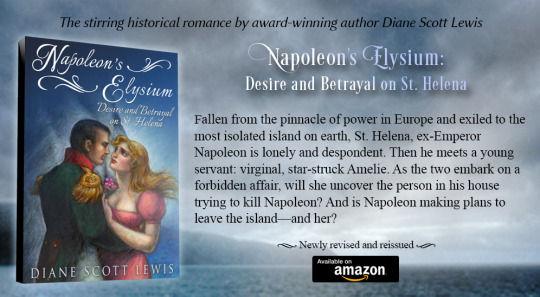
#napoleon#napoleon bonaparte#art#illustration#book cover#romance art#napoleon's elysium#diane scott lewis
167 notes
·
View notes
Text
Maria Leopoldine of Austria-Este
@microcosme11 had asked me about this lady of the Bavarian court:

Her name is Maria Leopoldine von Österreich-Este, and she played a huge role in making sure that Max Joseph, Eugène‘s future father-in-law, inherited the title of Elector of Bavaria. As a matter of fact, it‘s a highly educating tale of how to become elector in Munich in the first place.
Unfortunately, it will need a lot of explanation, as this takes us deeply into the rivalries and century-old feuds between the different German principalities that Napoleon Bonaparte would soon know to exploit so well. Let‘s just say, Habsburg (Austria) and Wittelsbach (Bavaria) had not seen eye to eye for quite some time when the Bavarian branch of House Wittelsbach, the one holding the position of Bavarian elector, was about to go extinct.
Many branches of the family went extinct around that time, in fact, and not only of this family. Be it that centuries of inbreeding finally took their toll, be it a general unwillingness to do more than the bare minimum to ensure the family had an appropriate heir (»No, no, no. We‘ve done our duty, we‘ve had one son. It‘s not our fault he died. We‘re not doing that again!«) or even to marry an appropriate but not necessarily attractive partner with whom you could have children able to inherit – the number of males in those princely families got rather low during the 18th century.
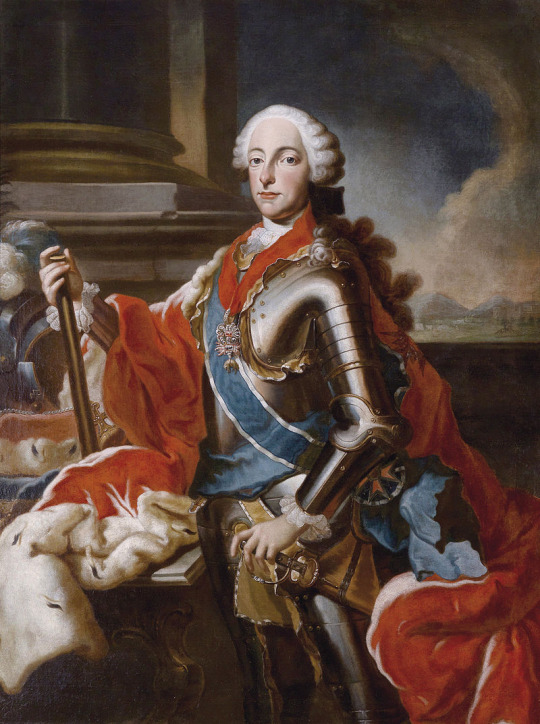
In 1777 – twelve years before the French Revolution, just for context – Maximilian Joseph III, the last elector from the old Bavarian branch of the Wittelsbach family, died without a son. There were of course more branches of the family, most importantly the branch that held the electorate of the Palatinate, and then some less important, not ruling branches, like the Zweibrücken-Birkenfelds. Now, technically, if a German prince died without an heir, things would get all medieval: the liege – the Bavarian electorate, in this case - would fall back to the liege lord. The emperor.
The Habsburg emperor in Vienna! No f-ing way!
... said not only the Bavarians but also the kings of France and Prussia, who had no interest in Austria gaining that much territory. In order to prevent it from happening, the different Wittelsbach branches in a multitude of »house contracts« had declared several years before that the family branches would all inherit from each other if one went extinct. The Austrians might have protested against that arrangement but they had just done something quite similar in order to ensure that the last emperor‘s daughter Maria Theresia could inherit, so they were in a bad position to argue. Which doesn‘t mean they didn‘t. But after some more bad blood, even a »War of the Bavarian Succession« that is a funny story in itself, things settled down, and a guy named Karl Theodor (Charles Theodore) became elector of both Bavaria and the Palatinate.

There was a huge down-side to this advancement, from his perspective: he had to move to Bavaria. Uncivilised, almost medieval, hilly-billy Bavaria. He hated that place, and for good reasons. He was a very cultivated person, and this was a very uncultivated place (according to some, it still is *coughcough*). The Bavarians, as to them, liked this new guy in Munich about as much as he liked them. And another problem was already looming on the horizon: Karl Theodor had plenty of children – but only one son with his wife, and this son happened to die a day after he was born. Apparently this was one of those cases where the spouses thought once had been enough and refused to give it another try. And Karl Theodor could not even marry somebody else because – catholic. No divorce. And his unloved wife was in good health. To sum up: No immediate heir in this family either.
Which brings us to the Zweibrücken family branch. At the time when Karl Theodor moved to Munich, this branch of the Wittelsbach family consisted of two brothers: Karl August and Maximilian Joseph (yes, that‘s our Max, future king of Bavaria). Their father, Friedrich Michael, had died young as a military officer in French service, so they had grown up at the court of their uncle, Friedrich Michael‘s older brother Christian. Christian – just saying – had simply refused to marry a partner of equal birth and instead conducted a morganatic marriage with a French actress. A very happy one, by the way. The burden to ensure the family would continue thus had fallen to Friedrich Michael, who had married a sister of Karl Theodor‘s wife, had made her four kids (two sons, two daughters) and bedded pretty much every willing lady of the French court before accusing his wife of adultery, locking her up in some monastery (Max Joseph probably saw his mother last when he was three years old), and then getting himself killed in some war or other.
By 1778, both Friedrich Michael and Christian were dead, and as Christian‘s many children could not inherit his titles, Karl August had become Count Palatine of Zweibrücken (Deux-Ponts in French). Due to his »uncle« Karl Theodor‘s lack of a legitimate son, he and his younger brother Max Joseph also were the next heirs to the combined Bavarian and Palatine electorate.

(Karl August, older brother to future king Max Joseph)
Meanwhile in Munich, Karl Theodor really got annoyed with this gruesome country he had been forced to move into. However, for the first time in a long while this was a Bavarian elector who had good relations with the Habsburgs. After some negotiations between Munich and Vienna Karl Theodor and emperor Joseph II came up with a plan that would make everybody happy: Karl Theodor would exchange the Bavarian territory (or some portion of it) for the Austrian Netherlands. Austria would finally add Bavaria to its territory, and Karl Theodor could move to a nicer place.
This caused an uproar among the Bavarian population. Becoming Austrians? Never! - The Bavarian estates sent delegation after delegation to the Zweibrücken nephews with desperate pleas for help (they also paid these nephews‘ debts). Karl August and Max Joseph immediately protested against the plan, and it turned out that according to the fineprint in those house contracts mentioned above Karl Theodor could not make the deal with Vienna without his nephews‘ consent. Bummer.
France and Prussia also put a word in, and France did even more: When Karl August‘s only son (yet another only child) died in 1784, with little chance for a legitimate replacement, the French king personally made sure that Max Joseph, the younger brother, a great womanizer and obstinate bachelor, would get married to an appropriate lady who could give birth to many legitimate heirs of the Bavarian electorate (oh, and Louis also paid Max Joseph‘s debts. That‘s a recurring theme in the story). Max Joseph, after lots of wailing and resisting, was finally dragged in front of the altar in 1785 and, to his great surprise, found that he loved marriage life, family and children. Not necessarily enough to give up on his womanizing ways. But this whole family thing, having kids and stuff? That was also kinda fun.

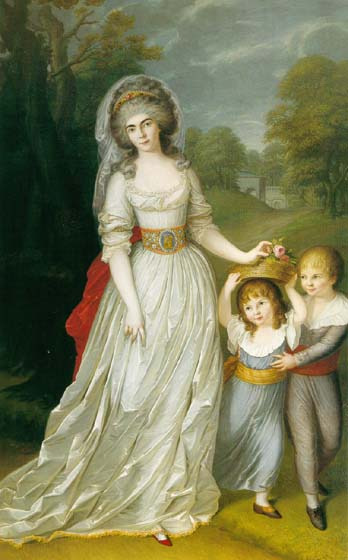
(Max Joseph’s first wife Auguste Wilhelmine and their two oldest children, crown prince Ludwig and - yes, that’s little Auguste)
Let‘s fast forward a little: The French Revolution breaks out. Max Joseph, so far one of the many foreign princes in French service, looses everything and, with a wife and five children, becomes a refugee. For some time, so does his brother. Then over the next years, many people die: Max‘s first wife (he will quickly remarry), one of his daughters - and his brother Karl August. Making Max Joseph the heir apparent to the electorate of the Palatinate and of Bavaria.
Except that, in 1794, one more person died: Elector Karl Theodor‘s wife. The Austrians acted quickly and offered the mourning widower (who had 70 years of age) an archduchess as new bride in order to produce an heir with, just so Bavaria would not fall into the clutches of this former French colonel Max Joseph von Zweibrücken who was very unlikely to make any similar deals with the Habsburgs.
And now we finally can introduce the lady this is all about:

Maria Leopoldine was the daughter of Ferdinand Karl von Österreich-Este, who in turn was one of the many children of Maria Theresia (i.e. a brother to the emperors Joseph and Leopold and queens Marie Antoinette and Maria Carolina of Naples) and ruled in Milan. (A year after Maria Leopoldine had married, her family would be kicked out of their home by one Napoleon Bonaparte and his army of Italy). She was 19 years old when she was ordered to marry 70-year-old elector Karl Theodor, and a young lady with lots of self-esteem. Allegedly, when she first saw the bridegroom‘s portrait, she exclaimed: »Thank god he‘s already that old!« - Obviously, it was love on first sight.
The marriage life of the happy newly-weds turned out to be just as full of harmony and roses as could be expected: Maria Leopoldine locked her bedroom door. Well, at least for her husband. Not so much for anybody else. And to make matters worse, her new »nephew« Max Joseph showed up in Munich, as he did from time to time. Just to remind Karl Theodor who was his heir probably, but this time ostensibly to pay his homage to the new aunt Maria Leopoldine. According to a story crown prince Ludwig was told much later, Max Joseph was quite thorough about this task and, unlike his uncle, did make it into Maria Leopoldine‘s bedroom. Did I mention Max never quite gave up on his womanizing ways?
In any case, Maria Lepoldine had made up her mind: She very much preferred the nephew over her husband, thank you for asking. If there was anything she could do to ensure the Austrians (that is, her own Habsburg family!) would not receive Bavaria, she would do it.
Turns out, she could do a lot.
Fast forward to 1799. Karl Theodor suffers from a stroke while playing cards. It‘s not his first, but this one is serious. The old elector still breathes, but the doctors are agreed there‘s nothing they can do. It‘s just a matter of time now.
Time that the Austrian ambassadors in Munich want to use. Contracts for an exchange or sale of Bavarian territory to Austria have long been drawn up, all they need is the elector‘s signature! Surely now, in his last hours, Karl Theodor will not hesitate any longer? They enter the Munich Residence, talk or bribe their way into the private rooms of the elector’s family, into the elector‘s rooms, to his bedroom - and then there‘s somebody on the doorstep. Maria Leopoldine.
And. She. Will. Not. Move. - Forget Gandalf against the Balrog of Moria. Maria Leopoldine against the Habsburg ambassador was the real thing. In the end, the Austrians, most likely after lots of cursing and footstomping, had to leave. In case they hoped they would be luckier at another occasion, they were disappointed: For the first time during their marriage, Maria Leopoldine focused solely on her husband and gave him all her attention, until he breathed his last.
At which point she had all gates of Munich locked. All Austrian couriers on their way to inform Vienna were turned back. The only dispatch that did go out was one to Max Joseph, in which Maria Leopoldine declared herself Max‘s devoted subject and invited him to come to Munich and take over power as soon as possible.
Which Max did. Not necessarily as quickly and forcefully as Maria Leopoldine had acted. But it sufficed.
There was one more point in which Maria Leopoldine helped Max a lot. After her husband‘s death, state officials in the presence of the Austrian ambassador had an interview with her, inquiring if Maria Leopoldine happened to be pregnant. Because a son by Karl Theodor, even posthumously born, would have inherited before Max Joseph. She answered »No«.
Now, as chance would have it, some months later, she went on a lengthy journey that we are very badly informed about, and only returned a year later, after most likely having given birth to a child somewhere on the way. A child whose father surely had not been Karl Theodor. But the Austrians probably would not have cared.
Maria Leopoldine stayed in Munich, much beloved by Max Joseph, and became the enfant terrible of his court, had lovers in abundance, excelled at investing her money, at some point bought a farm where she, if need be, personally helped with the hay-making, and even married morganatically (possibly so she had an official father for her children). She was a close friend of Eugène but not so much of his wife. Maybe she never quite forgave Auguste that her arranged marriage had turned out so well when her own had been such a disaster.
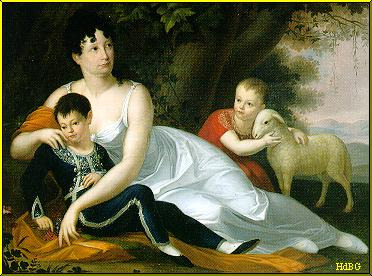
(Maria Leopoldine in later years, with her two sons)
#Maria Leopoldine of Austria-Este#Bavarian court#Munich#max joseph#charles theodore#habsburg and wittelsbach
28 notes
·
View notes
Text
Dear Neighbors… I just had a panic attack. I’m so sorry but this derails the review schedule… again. Dammit.
(Please don’t worry, I’m feeling better now. I got anxious about something completely unrelated to reviews)
Once again, I’m sorry about this. The review will be out by Saturday and I already have a draft of it… if you still want to see it even after so many delays… @tairin @amypihcs @aminoscribbles @josefavomjaaga @maggiec70 @dartharaiz @blackwidowmarshal123 @pobodleru @count-lero @michel-feuilly @captainknell @microcosme11 @elisabeth515 @klara-1838 @sollannaart @au-pas-camarades , @joachimnapoleon , @kaxen , I’m truly sorry that I broke my promise… but I will correct it. Luckily I’m calming down already.
(Tiny spoiler, I really enjoyed the book! Thank you for writing it, @garethwilliamsauthor ! And thank you to @suburbanbeatnik for introducing me to this story.)
33 notes
·
View notes
Text
@suniikennedy thanks :)

@literaldump-ko @mai-von-weissenfels @napolka @burritofriedrich @microcosme11 , don't know anyone who sees this
New tag game
Insert a photo that you already have in your gallery that best describes you. saw this in the "tag game" tag

ntps: @red-in-revenge @toasterfroggy @allnewtpir @mike-queerler @foodiewithdahoodie @aidyaiden @newaronantics @unrepentant-byler-shipper @kirjavafan @rebelrobinrules1984 @sunflowerswren @notmybabies @emily-mooon @starmanbyler @microwaveonwheels @weirdo09 @iliataslost @charliethe3gg
6K notes
·
View notes
Text
So thanks to @microcosme11 who showed a lot of interest in the incredible painting “Battle of Leipzig” by Johann Peter Kraft I’ve decided to consecrate a series of posts to the main participants of the event depicted on the canvas!
It’s simply going to be a bunch of my guesses about who is who over there. 👀

Unfortunately I’m going to illustrate my ideas with such an amount of pictures that it’s simply a necessity to divide this post into several parts…
Well, as an old Russian saying goes, “Don’t feed me bread, just let my speak a lot about 19-century men in fancy uniforms”!
Ahem.
So here comes part 1!
First of all, let’s start with the most important participants - three allied monarchs themselves. Here they are: Alexander I of Russia, Franz II of Austria and Friedrich Wilhelm III of Prussia. 👑
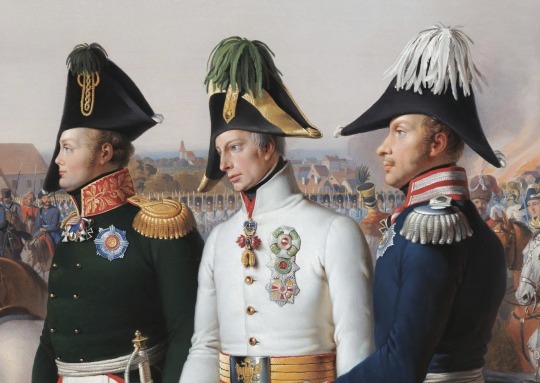
…Aaaaand I was lucky enough to find some old photos I took in the State Hermitage Museum during my last trip to Saint-Petersburg!
I guess Saint-Petersburg is at some point the second home for each and every lover of the Russian Empire. Even nowadays the city itself represents the living remains of that illustrious period in Russian history. :)
As for the paintings those epic depictions of allied monarchs are located in the Military Gallery of the Winter palace. The portrait of Franz II is also one of Kraft’s works which was presented by Kaiser himself to Alexander I when the latter decided to organise the Military Gallery (which is also dedicated to the victory of Leipzig, what a coincidence) in the 1820s while the portraits of Alexander and Friedrich were made by the German painter Franz Krüger who had been working for the Russian Imperial court for a long period of time.
All three of them look truly magnificent but it’s a little bit hard to find the right angle for a photo because they hang pretty high and are gigantic. 😅
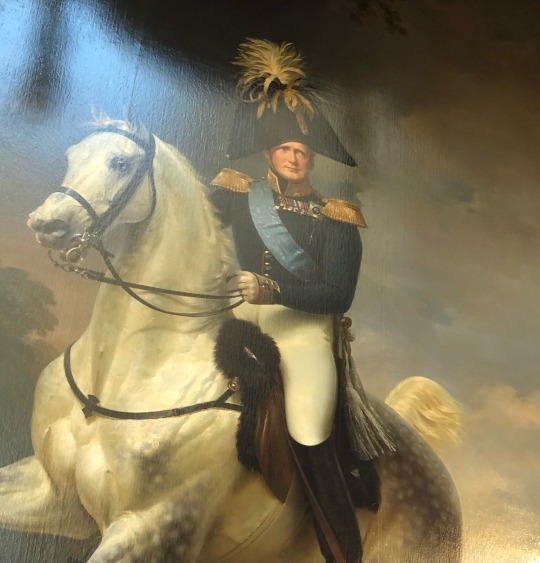
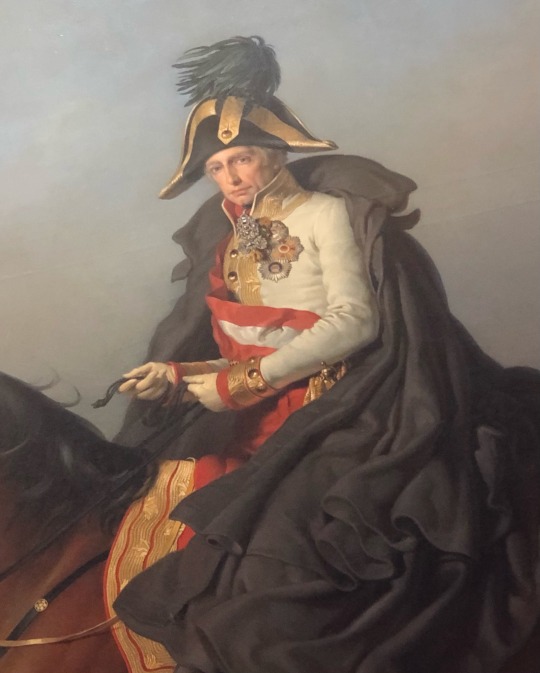
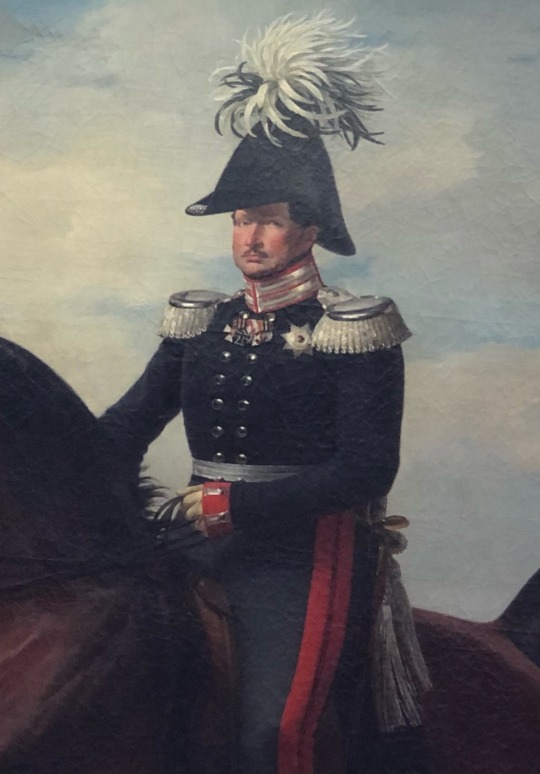
Okay, back to the “Battle of Leipzig”~
Since monarchs were usually followed by an escort of their loyal courtiers, the exact same thing goes for the Kraft’s painting. This time for the major part it consists of different military men. I believe most of them come from the general headquarters.
There are three major figures accordingly behind Alexander, Franz and Friedrich - three chiefs-of-staff of the allied forces.
The first man in the crowd is (I’m still not entirely sure about him but it would be still logical to some extent) August Neidhardt von Gneisenau, quartermaster-general of the Silesian army and Blücher’s right-hand man.
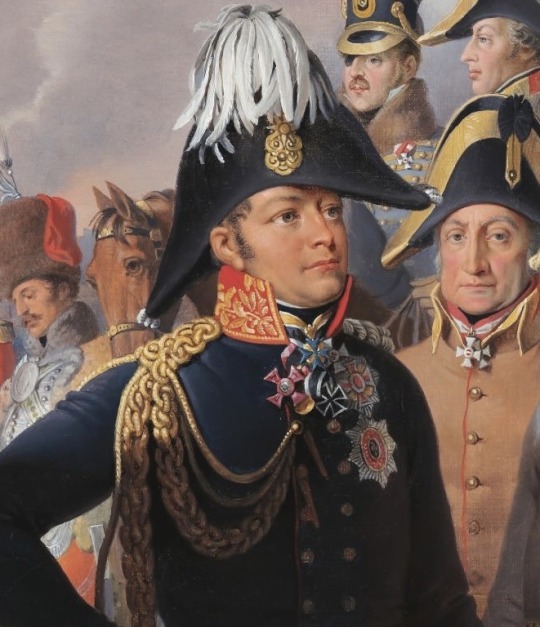

The second one is probably (like I don’t know where his aiguillettes are but the resemblance is quite obvious) Pyotr Mikhailovich Volkonsky, chief-of-staff in the Russian army.
He became one of the Alexander’s closest friends since he was introduced to him by his father Pavel I, the emperor of Russia, when Alexander was still a grand-duke (or how we call him in Russian - цесаревич / tsesarevich ✨).
By the way, Volkonsky and his colleague Mikhail Semyonovich Vorontsov, a general who also went through all Napoleonic wars, were the only commanders in the Russian army who received the Grand Cross of the British Order of the Bath after all the struggles.
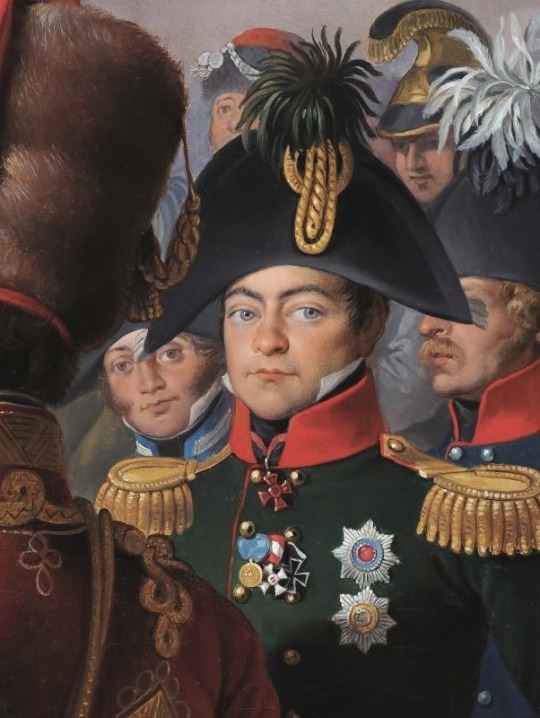
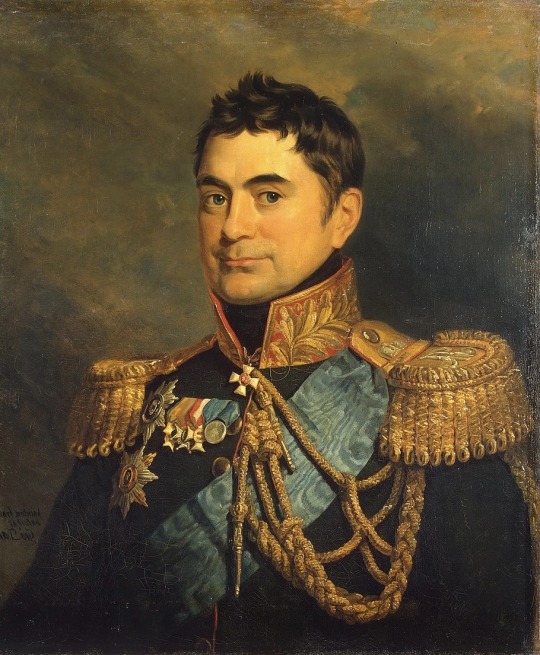
And here is Vorontsov as a small postcriptum. :)
Mikhail was the eldest son of Semyon Romanovich Vorontsov, a Russian diplomat who served as an ambassador in the United Kingdom for almost thirty years! That was the main reason why he knew English language as well as his mother tongue, Russian.
In the nearest troublesome future he and Wellington actually became very good friends as well! 🇷🇺🇬🇧
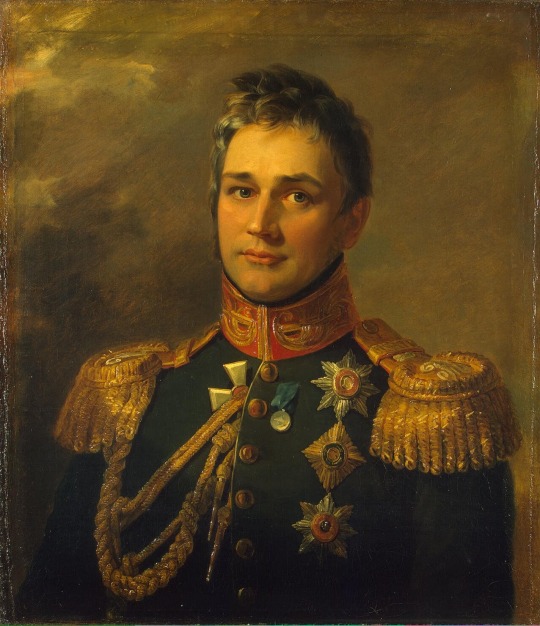
To be continued 🔜
#napoleonic era#napoleonic wars#battle of leipzig#völkerschlacht bei leipzig#battle of the nations#alexander i of russia#franz II of austria#friedrich wilhelm III of prussia#august von gneisenau#pyotr mikhailovich volkonsky#mikhail semyonovich vorontsov#19th century
50 notes
·
View notes
Text
And this is my version of „Napoleonic” Christmas!

And thank you all who tagged me for making their year better! You definitely made better mine!
And special thanks to @honoratel (and @karolkurpinski ), @elisabeth515 @joachimnapoleon @histoireettralala, @microcosme11 and @twice-told-tales
PS If anyone guess what a figure I placed at the top of the tree... as a reward I will make a version of this card with the figure you’d like ;)
44 notes
·
View notes
Text
I actually did hear the story about Desaix getting a bullet through both cheeks! Some sources claim he was unable to shout a command to advance because of that and sent his troops to attack with a gesture instead.
Also, that’s a second time a general gets a bullet through his cheeks… (the first time I learned about that type of injury was by looking up Murat).
P. S. Here’s a picture of Larrey from the same campaign! Credit goes to @microcosme11 , who posted the picture originally.

Napoleon Doodles
Some doodles of napoleon with a pen brush I got today I love twink napoleon sm😔 hes so drawable I understand David now why he liked drawing nap so much




#napoleon does not have a bob#neither does kleber#napoleonic era#napoleonic wars#art#history#louis charles antoine desaix#joachim murat
318 notes
·
View notes